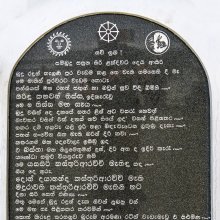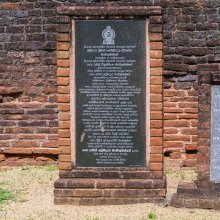Vani, Vāṇī, Vaṇi, Vanī, Vāṇi, Vaṉi, Vāṉi: 29 definitions
Introduction:
Vani means something in Hinduism, Sanskrit, Buddhism, Pali, the history of ancient India, Marathi, Jainism, Prakrit, Hindi, biology, Tamil. If you want to know the exact meaning, history, etymology or English translation of this term then check out the descriptions on this page. Add your comment or reference to a book if you want to contribute to this summary article.
Images (photo gallery)
(+2 more images available)
In Hinduism
Shaivism (Shaiva philosophy)
Source: Wisdom Library: Kubjikāmata-tantraVāṇī (वाणी, “eloquent speech”):—One of the nine Dūtī presided over by one of the nine bhaivaravas named Hāṭakeśa (emanation of Ananta, who is the central presiding deity of Dūtīcakra), according to the Kubjikāmata-tantra and the Ṣaṭsāhasrasaṃhitā.

Shaiva (शैव, śaiva) or Shaivism (śaivism) represents a tradition of Hinduism worshiping Shiva as the supreme being. Closely related to Shaktism, Shaiva literature includes a range of scriptures, including Tantras, while the root of this tradition may be traced back to the ancient Vedas.
Purana and Itihasa (epic history)
Source: archive.org: Shiva Purana - English TranslationVāṇī (वाणी) refers to “eloquence”, which is mentioned as obtainable through the worship of Śiva, according to the Śivapurāṇa 2.1.14:—“[...] a person desirous of learning shall worship half that number [for details, see text]. A person desirous of eloquence (vāṇī-kāma) shall worship Śiva with ghee”.
Source: Cologne Digital Sanskrit Dictionaries: The Purana IndexVāṇī (वाणी).—A whisk bearer of Lalitā, became consort of Brahmā—also Sarasvatī and Bhāratī.*
- * Brahmāṇḍa-purāṇa IV. 39. 67, 74; 43. 75 and 86.

The Purana (पुराण, purāṇas) refers to Sanskrit literature preserving ancient India’s vast cultural history, including historical legends, religious ceremonies, various arts and sciences. The eighteen mahapuranas total over 400,000 shlokas (metrical couplets) and date to at least several centuries BCE.
Natyashastra (theatrics and dramaturgy)
Source: Wisdom Library: SaṅgītaśiromaṇiVāṇī (वाणी) refers to Sarasvatī, (‘speech’) and is the presiding deity of añcita (honorific lit. ‘bent’), according to the Saṅgītaśiromaṇi 67-84. Añcita represents one of the sixteen words that together make up the elā musical composition (prabandha). Elā is an important subgenre of song and was regarded as an auspicious and important prabandha (composition) in ancient Indian music (gāndharva). According to nirukta analysis, the etymological meaning of elā can be explained as follows: a represents Viṣṇu, i represents Kāmadeva, la represents Lakṣmī.
Vāṇī is one of the sixteen deities presiding over the corresponding sixteen words of the elā-prabandha, all of which are defined in the Saṅgītaśiromaṇi (“crest-jewel of music”): a 15th-century Sanskrit work on Indian musicology (gāndharvaśāstra).

Natyashastra (नाट्यशास्त्र, nāṭyaśāstra) refers to both the ancient Indian tradition (shastra) of performing arts, (natya—theatrics, drama, dance, music), as well as the name of a Sanskrit work dealing with these subjects. It also teaches the rules for composing Dramatic plays (nataka), construction and performance of Theater, and Poetic works (kavya).
Vyakarana (Sanskrit grammar)
Source: Wikisource: A dictionary of Sanskrit grammarVāṇī (वाणी).—Speech; utterance; the same as वाच् (vāc) which is believed to be of four kinds as cited by the grammarians and explained by Bhartrhari; the four kinds are based upon the four places of origin, the three first places belonging to the inarticulate speech and the fourth belonging to the articulate one; cf. चत्वारि वाक्परिमिता पदानि तानि विदुर्ब्राह्मणा य मनीषिणः । गुहा त्रीणि निहिता नेङ्गयन्तिं तुरीयं वाचेी मनुष्या वदन्ति (catvāri vākparimitā padāni tāni vidurbrāhmaṇā ya manīṣiṇaḥ | guhā trīṇi nihitā neṅgayantiṃ turīyaṃ vāceी manuṣyā vadanti), M. Bh. I Ahnika 1 and the Pradipa and Uddyota thereon.

Vyakarana (व्याकरण, vyākaraṇa) refers to Sanskrit grammar and represents one of the six additional sciences (vedanga) to be studied along with the Vedas. Vyakarana concerns itself with the rules of Sanskrit grammar and linguistic analysis in order to establish the correct context of words and sentences.
Kavyashastra (science of poetry)
Source: Shodhganga: Bhismacaritam a critical studyVāṇī (वाणी) is the name of a Sanskrit metre (chandas) [defined as इ.उ.इ.इ] of the Upajāti type as employed in the Bhīṣmacarita (Bhishma Charitra) which is a mahākāvya (‘epic poem’) written by Hari Narayan Dikshit.—We find eleven examples of Vāṇī variety of Upajāti metre in the Bhīṣmacarita. The example of it is verse IV.9. [...] The other examples are as follows: IV.10, IV.20, IV.35, IV.37, IV.39, X.22, X.30, XI.16, XI.37 and XIV.12.

Kavyashastra (काव्यशास्त्र, kāvyaśāstra) refers to the ancient Indian tradition of poetry (kavya). Canonical literature (shastra) of the includes encyclopedic manuals dealing with prosody, rhetoric and various other guidelines serving to teach the poet how to compose literature.
Shaktism (Shakta philosophy)
Source: Google Books: ManthanabhairavatantramVāṇī (वाणी) refers to a “voice”, according to the commentary on the Manthānabhairavatantra, a vast sprawling work that belongs to a corpus of Tantric texts concerned with the worship of the goddess Kubjikā.—Accordingly, “[...] Then (she) [i.e., the Goddess] again assumed a body, (this time) in the house of mount Himavat. [...] Then Kālī was given to the Supreme Lord on mount Kailāśa in the house of the God of the gods. There a great instruction arose, that is, an unfailing voice (amogha-vāṇī) which (said): ‘there is something that is part of the tradition within the Kadamba Cave (namely), Śāmbhava knowledge’.”.
Source: Brill: Śaivism and the Tantric Traditions (shaktism)Vāṇī (वाणी) refers to a “voice”, according to Sāhib Kaul’s Śārikāstrotra.—Accordingly, “[...] My mind does not strive after the divine state, just as a woman giving birth never craves enjoyment. Having gained perfect devotion to you it sings like a peacock who has heard the sound of the rain clouds. There is no place where you do not reside; there is no voice (vāṇī) in which you are not expressed. There is no word in which you are not heard; there is no thing in which you do not shine. [...]”.

Shakta (शाक्त, śākta) or Shaktism (śāktism) represents a tradition of Hinduism where the Goddess (Devi) is revered and worshipped. Shakta literature includes a range of scriptures, including various Agamas and Tantras, although its roots may be traced back to the Vedas.
India history and geography
Source: Singhi Jain Series: Ratnaprabha-suri’s Kuvalayamala-katha (history)Vānī (वानी) is the Hindi spelling for Varṇa (“gold”), as mentioned in the “A Cultural note on the Kuvalayamala of Uddyotanasuri” by the late Dr. V. s. Agrawala.—(Cf. Jaccasuvaṇṇa) In the pre-Muslim period, the highest purity was of sixteen degree, and such gold was called ṣoḍaśa-varṇaka (Kāvyamīmāṃsā of Rājaśekhara, Saka 1900, chapter 17) which must have been the jacca-suvaṇṇa of Uddyotanasūri. We also find reference to ṣoḍaśa-varṇa gold in the Mānasollāsa from which was derived the Hindi word solaha-vānī which in Rajasthani became solamo-sono referred to as solen in the Jñāneśvarī (1290 A.D.).—(Cf. The highest purity of gold in India, The Journal of the Numesmatic Society of India, Vol. 16, pp. 270-74). This seems same as the śṛṅgī-kanaka mentioned in the Kādambarī.
Source: Institut Français de Pondichéry: The Shaivite legends of KanchipuramVāṇi (வாணி) (in Tamil) refers to Vāṇī in Sanskrit, and represents one of the proper nouns mentioned in the Kanchipuranam, which narrates the Shaivite Legends of Kanchipuram—an ancient and sacred district in Tamil Nadu (India). The Kanchipuranam (mentioning Vāṇi) reminds us that Kanchipuram represents an important seat of Hinduism where Vaishnavism and Shaivism have co-existed since ancient times.

The history of India traces the identification of countries, villages, towns and other regions of India, as well as mythology, zoology, royal dynasties, rulers, tribes, local festivities and traditions and regional languages. Ancient India enjoyed religious freedom and encourages the path of Dharma, a concept common to Buddhism, Hinduism, and Jainism.
Biology (plants and animals)
Source: Google Books: CRC World Dictionary (Regional names)Vani in India is the name of a plant defined with Carum copticum in various botanical sources. This page contains potential references in Ayurveda, modern medicine, and other folk traditions or local practices It has the synonym Carum copticum (L.) Sprague ex Turrill (among others).
Example references for further research on medicinal uses or toxicity (see latin names for full list):
· Journal of Ethnopharmacology (2007)
· Mantissa Plantarum (1767)
· The Flora of British India (1879)
· Flora of Tropical Africa (1877)
· Phytotherapy Research (2004)
· Enumeratio Plantarum Horti Regii Berolinensis Altera (1821)
If you are looking for specific details regarding Vani, for example chemical composition, side effects, health benefits, diet and recipes, pregnancy safety, extract dosage, have a look at these references.

This sections includes definitions from the five kingdoms of living things: Animals, Plants, Fungi, Protists and Monera. It will include both the official binomial nomenclature (scientific names usually in Latin) as well as regional spellings and variants.
Languages of India and abroad
Pali-English dictionary
Source: BuddhaSasana: Concise Pali-English Dictionaryvāṇī : (f.) word; speech.
Source: Sutta: The Pali Text Society's Pali-English DictionaryVaṇi, (f.) (fr. van to desire) wish, request Ud. 53; J. IV, 404 (=yācana C.); cp. J. P. T. S. 1891, 18 See vana2 & cp. vaṇeti. (Page 596)

Pali is the language of the Tipiṭaka, which is the sacred canon of Theravāda Buddhism and contains much of the Buddha’s speech. Closeley related to Sanskrit, both languages are used interchangeably between religions.
Marathi-English dictionary
Source: DDSA: The Molesworth Marathi and English Dictionaryvaṇī (वणी).—A form of the word pāṇī assumed in composition; as guḷavaṇī, miṭhavaṇī, ciñcavaṇī, kāḍhavaṇī.
--- OR ---
vāṇī (वाणी).—m (vāṇik S) A caste or an individual of it. They are corn-chandlers and grocers and retail dealers, a banyan. Pr. vāṇī dēta nāhīṃ āṇi ikaḍē purā tōla (The Wan̤i refuses to sell yet the other insists on having good weight.) Used where one is full and exact in his directions respecting the manner and particulars of an act which the other utterly refuses to perform. 2 A kind of manylegged and harmless worm. It is of blackish red, and it coils itself up on being touched. Otherwise called maṇḍaḷī or maṇḍāḷī.
--- OR ---
vāṇī (वाणी).—f (S) Speech; articulate utterance, or the faculty, or the divinity governing it. 2 A name of sarasvatī as the goddess of speech. vāṇī vadaṇēṃ or lavaṇēṃ To speak. Phrase used in remarking upon any speech considered as extraordinary. vāṇīvāṭēṃ nighaṇēṃ To be uttered.
--- OR ---
vāṇī (वाणी).—prep (vāṇa Color &c.) In the manner or similitude of; as or like. Ex. vēḍyāvāṇī kāya bōla- tōsa?
--- OR ---
vāṇī (वाणी).—f (uṇā) Deficiency, insufficiency, want, lack. See ex. under vāṇa f.
Source: DDSA: The Aryabhusan school dictionary, Marathi-Englishvaṇī (वणी).—A form of the word pāṇī assumed in composition; as guḷavaṇī, miṭhavaṇī, ciñcavaṇī &c.
--- OR ---
vāṇī (वाणी).—m A caste. f Speech. prep As or like.
Marathi is an Indo-European language having over 70 million native speakers people in (predominantly) Maharashtra India. Marathi, like many other Indo-Aryan languages, evolved from early forms of Prakrit, which itself is a subset of Sanskrit, one of the most ancient languages of the world.
Sanskrit dictionary
Source: DDSA: The practical Sanskrit-English dictionaryVani (वनि).—
1) Name of Agni.
2) A heap.
3) Asking, begging. -f. Desire, wish.
Derivable forms: vaniḥ (वनिः).
--- OR ---
Vanī (वनी).—A forest, wood, grove or thicket (of trees); पूगवनी (pūgavanī) Mv.7.13; अवनीतलमेव साधु मन्ये न वनी माघवनी विला- सहेतुः (avanītalameva sādhu manye na vanī māghavanī vilā- sahetuḥ) Jag; वनीमिमां ते पृतना प्रतनीमतनीयसीम् (vanīmimāṃ te pṛtanā pratanīmatanīyasīm) Śiva. B.19.1; कल्याणीं तु वनीमनीनयदहो कस्याप्यमृष्यन् वचः (kalyāṇīṃ tu vanīmanīnayadaho kasyāpyamṛṣyan vacaḥ) Viś. Guṇa.48.
--- OR ---
Vāṇi (वाणि).—f.
1) Weaving.
2) A weaver's loom.
3) Speech, words.
4) Name of Sarasvatī.
5) A cloud.
6) Price, value.
Derivable forms: vāṇiḥ (वाणिः).
--- OR ---
Vāṇī (वाणी).—
1) Speech, words, language; वाण्येका समलंकरोति पुरुषं या संस्कृता धार्यते (vāṇyekā samalaṃkaroti puruṣaṃ yā saṃskṛtā dhāryate) Bhartṛhari 2.19.
2) Power of speech.
3) Sound, voice; केका वाणी मयूरस्य (kekā vāṇī mayūrasya) Ak.; so आकाशवाणी (ākāśavāṇī).
4) A literary production, a work or composition; मद्वाणि मा कुरु विषादमनादरेण मात्सर्यमग्नमनसां सहसा खलानाम् (madvāṇi mā kuru viṣādamanādareṇa mātsaryamagnamanasāṃ sahasā khalānām) Bv.4.41; Uttararāmacarita 7.2.
5) Praise.
6) Sarasvatī, the goddess of learning; तव करकमलस्थां स्फाटिकीमक्षमालां, नखकिरणविभिन्नां दाडिमीबीजबुद्ध्या । अनुलवमनुकर्षन् येन कीरो निषिद्धः, स भवतु मम भूत्यै वाणि ते मन्दहासः (tava karakamalasthāṃ sphāṭikīmakṣamālāṃ, nakhakiraṇavibhinnāṃ dāḍimībījabuddhyā | anulavamanukarṣan yena kīro niṣiddhaḥ, sa bhavatu mama bhūtyai vāṇi te mandahāsaḥ) ||.
7) Eloquent speech.
8) Music.
9) Name of a metre consisting only of long syllables.
Source: Cologne Digital Sanskrit Dictionaries: Edgerton Buddhist Hybrid Sanskrit DictionaryVaṇi (वणि).—(n) [, as in Pali vani (Jātaka (Pali) vi.232.29), beggar; so most mss. at Mahāvastu i.87.14 (verse); but probably the true reading is vaśi(n), q.v., with Senart.]
Source: Cologne Digital Sanskrit Dictionaries: Shabda-Sagara Sanskrit-English DictionaryVani (वनि).—m.
(-niḥ) 1. Fire or its deity. 2. Wish, desire. E. van to worship, Unadi aff. in .
--- OR ---
Vāṇi (वाणि).—f. (-ṇiḥ or ṇī) 1. Weaving. 2. A weaver’s loom. 3. A species of the Ashti metre. E. vaṇ to sound, aff. ini; ṅīp optionally added.
--- OR ---
Vāṇī (वाणी).—f. (-ṇī) 1. Saraswati, the goddess of speech. 2. Speech, sound. 3. Voice, (as daivavāṇī). 4. Eloquence. 5. Praise. 6. A literary production. E. vaṇ to sound, aff. iñ and ṅīp or ṅīṣ added.
Source: Cologne Digital Sanskrit Dictionaries: Benfey Sanskrit-English DictionaryVani (वनि).—[van + i], m. 1. Fire or its deity. 2. Desire, wish.
--- OR ---
Vāṇi (वाणि).—vāṇī (vb. ve), f. 1. Weaving. 2. A weaver’s loom.
Vāṇi can also be spelled as Vāṇī (वाणी).
--- OR ---
Vāṇī (वाणी).—1. Speech, [Hitopadeśa] i. [distich] 99, M.M. 2. Voice,
Vani (वनि).—[feminine] request, desire, wish.
--- OR ---
Vāṇī (वाणी).—1. [feminine] reed; [dual] the two spring-bars on a carriage.
--- OR ---
Vāṇī (वाणी).—2. [feminine] music ([plural] choir of singers or musicians), sound, voice; speech, words, eloquence or the goddess Sarasvatī.
Source: Cologne Digital Sanskrit Dictionaries: Monier-Williams Sanskrit-English Dictionary1) Vanī (वनी):—[from vana > van] a f. a wood, forest, [Sāhitya-darpaṇa]
2) Vani (वनि):—[from van] f. wish, desire, [Atharva-veda]
3) [v.s. ...] m. fire, [cf. Lexicographers, esp. such as amarasiṃha, halāyudha, hemacandra, etc.] (vani ifc.) procuring, bestowing (cf. rāyas-poṣa-v and, [Pāṇini 3-2, 27]).
4) Vanī (वनी):—[from van] b See under 1. vana.
5) Vāṇī (वाणी):—[from vāṇa] a f. See below
6) [from vāṇa] 1. vāṇī f. sound, voice, music ([plural] a choir of musicians or singers), [Ṛg-veda] (the sapta vāṇīs are referred by the Comms. to the seven metres or to the seven notes of the gamut etc.)
7) [v.s. ...] speech, language, words, diction, ([especially]) eloquent speech or fine diction, [Mahābhārata; Kāvya literature] etc.
8) [v.s. ...] a literary production or composition, [Uttararāma-carita; Bhāminī-vilāsa]
9) [v.s. ...] praise, laudation, [Monier-Williams’ Sanskrit-English Dictionary]
10) [v.s. ...] the goddess of speech, Sarasvatī, [Rāmāyaṇa; Brahma-purāṇa]
11) [v.s. ...] Name of a metre consisting only of long syllables, [Kāvyādarśa [Scholiast or Commentator]]
12) [v.s. ...] of a river ([according to] to some the Sarasvatī), [Viṣṇu-purāṇa]
13) Vāṇi (वाणि):—f. (only [cf. Lexicographers, esp. such as amarasiṃha, halāyudha, hemacandra, etc.]; cf. 1. 2. vāṇī) weaving
14) a weaver’s loom
15) voice, speech
16) a species of metre
17) a cloud
18) price, value.
19) Vāṇī (वाणी):—2. vāṇī f. (cf. vāṇi) weaving, [cf. Lexicographers, esp. such as amarasiṃha, halāyudha, hemacandra, etc.]
20) 3. vāṇī f. reed, [Ṛg-veda v, 86, 1]
21) [dual number] the two bars of a car or carriage, [ib. i, 119, 5.]
Source: Cologne Digital Sanskrit Dictionaries: Yates Sanskrit-English Dictionary1) Vani (वनि):—(niḥ) 2. m. Fire or its deity.
2) Vāṇi (वाणि):—[(ṇiḥ-ṇī)] 2. 3. f. Weaving; a metre.
3) Vāṇī (वाणी):—(ṇī) 3. f. Saraswati, goddess of speech; speech; sound.
Source: DDSA: Paia-sadda-mahannavo; a comprehensive Prakrit Hindi dictionary (S)Vanī (वनी) in the Sanskrit language is related to the Prakrit words: Vaṇī, Vāṇi, Vāṇī.
[Sanskrit to German]
Sanskrit, also spelled संस्कृतम् (saṃskṛtam), is an ancient language of India commonly seen as the grandmother of the Indo-European language family (even English!). Closely allied with Prakrit and Pali, Sanskrit is more exhaustive in both grammar and terms and has the most extensive collection of literature in the world, greatly surpassing its sister-languages Greek and Latin.
Hindi dictionary
Source: DDSA: A practical Hindi-English dictionary1) Vanī (वनी):—(nf) a small forest.
2) Vāṇī (वाणी):—(nf) speech, voice; Saraswati:—the goddess of speech; ~[rahita/śūnya/hīna] speechless, mute.
...
Prakrit-English dictionary
Source: DDSA: Paia-sadda-mahannavo; a comprehensive Prakrit Hindi dictionary1) Vaṇi (वणि) in the Prakrit language is related to the Sanskrit word: Vraṇin.
2) Vaṇī (वणी) also relates to the Sanskrit word: Vanī.
3) Vāṇi (वाणि) also relates to the Sanskrit word: Vāṇi.
4) Vāṇī (वाणी) also relates to the Sanskrit word: Vāṇī.
Prakrit is an ancient language closely associated with both Pali and Sanskrit. Jain literature is often composed in this language or sub-dialects, such as the Agamas and their commentaries which are written in Ardhamagadhi and Maharashtri Prakrit. The earliest extant texts can be dated to as early as the 4th century BCE although core portions might be older.
Kannada-English dictionary
Source: Alar: Kannada-English corpusVāṇi (ವಾಣಿ):—
1) [noun] a man engaged in buying and selling; a merchant.
2) [noun] the community or caste of merchants.
3) [noun] a male member of this community.
4) [noun] any article of trade or commerce; a commodity.
--- OR ---
Vāṇi (ವಾಣಿ):—[noun] a woman intoxicated with alcoholic liquors.
--- OR ---
Vāṇi (ವಾಣಿ):—
1) [noun] a sound.
2) [noun] that which is spoken; utterance; speech.
3) [noun] a song sung musically.
4) [noun] the cry of a pea-cock.
5) [noun] Sarasvati, the Goddess of Speech.
--- OR ---
Vāṇi (ವಾಣಿ):—
1) [noun] the act, process or art of weaving.
2) [noun] a machine for weaving threads or yarn into cloth; a loom.
Kannada is a Dravidian language (as opposed to the Indo-European language family) mainly spoken in the southwestern region of India.
Nepali dictionary
Source: unoes: Nepali-English Dictionary1) Vanī (वनी):—n. a small forest;
2) Vāṇī (वाणी):—n. 1. speech; words; language; 2. power of speech; 3. sound; voice; 4. literary composition; 5. praise; eulogy;
Nepali is the primary language of the Nepalese people counting almost 20 million native speakers. The country of Nepal is situated in the Himalaya mountain range to the north of India.
See also (Relevant definitions)
Starts with (+170): Vani-an, Vani-an-chi-khat, Vania, Vania, Vania, Vania, Vania, Vaniaya, Vanibhushana, Vanicai, Vanicam, Vanican, Vanicci, Vaniccimeni, Vanici, Vanidenica, Vaniga, Vanigbandhu, Vanigbhava, Vaniggrama.
Ends with (+757): Abhavani, Abhishavani, Abhyavani, Accuruvani, Acuvani, Adakavani, Adavani, Adhavani, Adhikaravani, Adhvani, Adibhavani, Adityavani, Adivani, Agasavani, Agavani, Aggavani, Agghavani, Agnihotrahavani, Agvani, Ahavvani.
Full-text (+242): Antarvani, Akashavani, Varavani, Prativani, Kelivani, Paravani, Daivavani, Meharabani, Vanibhushana, Dharavani, Vanikelvan, Vanimalar, Galavata-Vanda-Vana-Vani, Vrindavani, Pravani, Vaniyati, Vanin, Lanta vaani, Vaṇeti, Kata vaani.
Relevant text
Search found 55 books and stories containing Vani, Vaani, Vāṇī, Vaṇi, Vaṇī, Vanī, Vāṇi, Vānī, Vaṉi, Vāṉi; (plurals include: Vanis, Vaanis, Vāṇīs, Vaṇis, Vaṇīs, Vanīs, Vāṇis, Vānīs, Vaṉis, Vāṉis). You can also click to the full overview containing English textual excerpts. Below are direct links for the most relevant articles:
Garga Samhita (English) (by Danavir Goswami)
Verse 1.13.4 < [Chapter 13 - The Liberation of Pūtanā]
Verse 2.18.28 < [Chapter 18 - The Sight of Śrī Kṛṣṇacandra]
Verse 5.21.37 < [Chapter 21 - The Story of Śrī Nārada]
Rig Veda (translation and commentary) (by H. H. Wilson)
The Gautami Mahatmya (by G. P. Bhatt)
Chaitanya Bhagavata (by Bhumipati Dāsa)
Verse 1.17.138 < [Chapter 17 - The Lord’s Travel to Gayā]
Verse 3.3.369 < [Chapter 3 - Mahāprabhu’s Deliverance of Sarvabhauma, Exhibition of His Six-armed Form, and Journey to Bengal]
Verse 1.4.73 < [Chapter 4 - Name-giving Ceremony, Childhood Pastimes, and Thieves Kidnap the Lord]
Lord Jhulelal: An Analytical Study (by Thakkar Harish Gopalji)
Part 5.5 - Janam Sakhi Shri Amar Uderolal Saheb < [Chapter 2 - Literature Review]
Part 5.8 - Poojya Jhulelal Janam Saakhi E Biyo Bhado Amar Vani < [Chapter 2 - Literature Review]
Part 5.2 - Literature Reviews (Introduction) < [Chapter 2 - Literature Review]
Sahitya-kaumudi by Baladeva Vidyabhushana (by Gaurapada Dāsa)
Text 11.39 < [Chapter 11 - Additional Ornaments]
Text 9.38 [sword diagram] < [Chapter 9 - Ornaments of Sound]
Text 7.69 < [Chapter 7 - Literary Faults]





